- Home
- Michael Ondaatje
The English Patient
The English Patient Read online
THE ENGLISH PATIENT
Michael Ondaatje
CONTENTS
I The Villa
II In Near Ruins
III Sometime a Fire
IV South Cairo 1930–1938
V Katharine
VI A Buried Plane
VII In Situ
VIII The Holy Forest
IX The Cave of Swimmers
X August
In memory of
Skip and Mary Dickinson
For Quintin and Griffin
And for Louise Dennys,
with thanks
‘Most of you, I am sure, remember the tragic circumstances of the death of Geoffrey Clifton at Gilf Kebir, followed later by the disappearance of his wife, Katharine Clifton, which took place during the 1939 desert expedition in search of Zerzura.
‘I cannot begin this meeting tonight without referring very sympathetically to those tragic occurrences.
‘The lecture this evening …’
From the minutes of the
Geographical Society meeting
of November 194–, London
I
The Villa
She stands up in the garden where she has been working and looks into the distance. She has sensed a shift in the weather. There is another gust of wind, a buckle of noise in the air, and the tall cypresses sway. She turns and moves uphill towards the house, climbing over a low wall, feeling the first drops of rain on her bare arms. She crosses the loggia and quickly enters the house.
In the kitchen she doesn’t pause but goes through it and climbs the stairs which are in darkness and then continues along the long hall, at the end of which is a wedge of light from an open door.
She turns into the room which is another garden — this one made up of trees and bowers painted over its walls and ceiling. The man lies on the bed, his body exposed to the breeze, and he turns his head slowly towards her as she enters.
Every four days she washes his black body, beginning at the destroyed feet. She wets a washcloth and holding it above his ankles squeezes the water onto him, looking up as he murmurs, seeing his smile. Above the shins the burns are worst. Beyond purple. Bone.
She has nursed him for months and she knows the body well, the penis sleeping like a sea horse, the thin tight hips. Hipbones of Christ, she thinks. He is her despairing saint. He lies flat on his back, no pillow, looking up at the foliage painted onto the ceiling, its canopy of branches, and above that, blue sky.
She pours calamine in stripes across his chest where he is less burned, where she can touch him. She loves the hollow below the lowest rib, its cliff of skin. Reaching his shoulders she blows cool air onto his neck, and he mutters.
What? she asks, coming out of her concentration.
He turns his dark face with its grey eyes towards her. She puts her hand into her pocket. She unskins the plum with her teeth, withdraws the stone and passes the flesh of the fruit into his mouth.
He whispers again, dragging the listening heart of the young nurse beside him to wherever his mind is, into that well of memory he kept plunging into during those months before he died.
There are stories the man recites quietly into the room which slip from level to level like a hawk. He wakes in the painted arbour that surrounds him with its spilling flowers, arms of great trees. He remembers picnics, a woman who kissed parts of his body that now are burned into the colour of aubergine.
I have spent weeks in the desert, forgetting to look at the moon, he says, as a married man may spend days never looking into the face of his wife. These are not sins of omission but signs of preoccupation.
His eyes lock onto the young woman’s face. If she moves her head, his stare will travel alongside her into the wall. She leans forward. How were you burned?
It is late afternoon. His hands play with a piece of sheet, the back of his fingers caressing it.
I fell burning into the desert.
They found my body and made me a boat of sticks and dragged me across the desert. We were in the Sand Sea, now and then crossing dry riverbeds. Nomads, you see. Bedouin. I flew down and the sand itself caught fire. They saw me stand up naked out of it. The leather helmet on my head in flames. They strapped me onto a cradle, a carcass boat, and feet thudded along as they ran with me. I had broken the spareness of the desert.
The Bedouin knew about fire. They knew about planes that since 1939 had been falling out of the sky. Some of their tools and utensils were made from the metal of crashed planes and tanks. It was the time of the war in heaven. They could recognize the drone of a wounded plane, they knew how to pick their way through such shipwrecks. A small bolt from a cockpit became jewellery. I was perhaps the first one to stand up alive out of a burning machine. A man whose head was on fire. They didn’t know my name. I didn’t know their tribe.
Who are you?
I don’t know. You keep asking me.
You said you were English.
At night he is never tired enough to sleep. She reads to him from whatever book she is able to find in the library downstairs. The candle flickers over the page and over the young nurse’s talking face, barely revealing at this hour the trees and vista that decorate the walls. He listens to her, swallowing her words like water.
If it is cold she moves carefully into the bed and lies beside him. She can place no weight upon him without giving him pain, not even her thin wrist.
Sometimes at two a.m. he is not yet asleep, his eyes open in the darkness.
He could smell the oasis before he saw it. The liquid in the air. The rustle of things. Palms and bridles. The banging of tin cans whose deep pitch revealed they were full of water.
They poured oil onto large pieces of soft cloth and placed them on him. He was anointed.
He could sense the one silent man who always remained beside him, the flavour of his breath when he bent down to unwrap him every twenty-four hours at nightfall, to examine his skin in the dark.
Unclothed he was once again the man naked beside the blazing aircraft. They spread the layers of grey felt over him. What great nation had found him, he wondered. What country invented such soft dates to be chewed by the man beside him and then passed from that mouth into his. During this time with these people, he could not remember where he was from. He could have been, for all he knew, the enemy he had been fighting from the air.
Later, at the hospital in Pisa, he thought he saw beside him the face that had come each night and chewed and softened the dates and passed them down into his mouth.
There was no colour during those nights. No speech or song. The Bedouin silenced themselves when he was awake. He was on an altar of hammock and he imagined in his vanity hundreds of them around him and there may have been just two who had found him, plucked the antlered hat of fire from his head. Those two he knew only by the taste of saliva that entered him along with the date or by the sound of their feet running.
She would sit and read, the book under the waver of light. She would glance now and then down the hall of the villa that had been a war hospital, where she had lived with the other nurses before they had all transferred out gradually, the war moving north, the war almost over.
This was the time in her life that she fell upon books as the only door out of her cell. They became half her world. She sat at the night table, hunched over, reading of the young boy in India who learned to memorize diverse jewels and objects on a tray, tossed from teacher to teacher – those who taught him dialect those who taught him memory those who taught him to escape the hypnotic.
The book lay on her lap. She realized that for more than five minutes she had been looking at the porousness of the paper, the crease at the corner of page 17 which someone had folded over as a mark. She brushed
her hand over its skin. A scurry in her mind like a mouse in the ceiling, a moth on the night window. She looked down the hall, though there was no one else living there now, no one except the English patient and herself in the Villa San Girolamo. She had enough vegetables planted in the bombed-out orchard above the house for them to survive, a man coming now and then from the town with whom she would trade soap and sheets and whatever there was left in this war hospital for other essentials. Some beans, some meats. The man had left her two bottles of wine, and each night after she had lain with the Englishman and he was asleep, she would ceremoniously pour herself a small beaker and carry it back to the night table just outside the three-quarter-closed door and sip away further into whatever book she was reading.
So the books for the Englishman, as he listened intently or not, had gaps of plot like sections of a road washed out by storms, missing incidents as if locusts had consumed a section of tapestry, as if plaster loosened by the bombing had fallen away from a mural at night.
The villa that she and the Englishman inhabited now was much like that. Some rooms could not be entered because of rubble. One bomb crater allowed moon and rain into the library downstairs – where there was in one corner a permanently soaked armchair.
She was not concerned about the Englishman as far as the gaps in plot were concerned. She gave no summary of the missing chapters. She simply brought out the book and said ‘page ninety-six’ or ‘page one hundred and eleven.’ That was the only locator. She lifted both of his hands to her face and smelled them – the odour of sickness still in them.
Your hands are getting rough, he said.
The weeds and thistles and digging.
Be careful. I warned you about the dangers.
I know.
Then she began to read.
Her father had taught her about hands. About a dog’s paws. Whenever her father was alone with a dog in a house he would lean over and smell the skin at the base of its paw. This, he would say, as if coming away from a brandy snifter, is the greatest smell in the world! A bouquet! Great rumours of travel! She would pretend disgust, but the dog’s paw was a wonder: the smell of it never suggested dirt. It’s a cathedral! her father had said, so-and-so’s garden, that field of grasses, a walk through cyclamen – a concentration of hints of all the paths the animal had taken during the day.
A scurry in the ceiling like a mouse, and she looked up from the book again.
They unwrapped the mask of herbs from his face. The day of the eclipse. They were waiting for it. Where was he? What civilisation was this that understood the predictions of weather and light? El Ahmar or El Abyadd, for they must be one of the northwest desert tribes. Those who could catch a man out of the sky, who covered his face with a mask of oasis reeds knitted together. He had now a bearing of grass. His favourite garden in the world had been the grass garden at Kew, the colours so delicate and various, like levels of ash on a hill.
He gazed onto the landscape under the eclipse. They had taught him by now to raise his arms and drag strength into his body from the universe, the way the desert pulled down planes. He was carried in a palanquin of felt and branch. He saw the moving veins of flamingos across his sight in the half-darkness of the covered sun.
Always there were ointments, or darkness, against his skin. One night he heard what seemed to be wind chimes high in the air, and after a while it stopped and he fell asleep with a hunger for it, that noise like the slowed-down sound from the throat of a bird, perhaps flamingo, or a desert fox, which one of the men kept in a sewn-half-closed pocket in his burnoose.
The next day he heard snatches of the glassy sound as he lay once more covered in cloth. A noise out of the darkness. At twilight the felt was unwrapped and he saw a man’s head on a table moving towards him, then realized the man wore a giant yoke from which hung hundreds of small bottles on different lengths of string and wire. Moving as if part of a glass curtain, his body enveloped within that sphere.
The figure resembled most of all those drawings of archangels he had tried to copy as a schoolboy, never solving how one body could have space for the muscles of such wings. The man moved with a long, slow gait, so smoothly there was hardly a tilt in the bottles. A wave of glass, an archangel, all the ointments within the bottles warmed from the sun, so when they were rubbed onto skin they seemed to have been heated especially for a wound. Behind him was translated light – blues and other colours shivering in the haze and sand. The faint glass noise and the diverse colours and the regal walk and his face like a lean dark gun.
Up close the glass was rough and sandblasted, glass that had lost its civilisation. Each bottle had a minute cork the man plucked out with his teeth and kept in his lips while mixing one bottle’s contents with another’s, a second cork also in his teeth. He stood over the supine burned body with his wings, sank two sticks deep into the sand and then moved away free of the six-foot yoke, which balanced now within the crutches of the two sticks. He stepped out from under his shop. He sank to his knees and came towards the burned pilot and put his cold hands on his neck and held them there.
He was known to everyone along the camel route from the Sudan north to Giza, the Forty Days Road. He met the caravans, traded spice and liquid, and moved between oases and water camps. He walked through sandstorms with this coat of bottles, his ears plugged with two other small corks so he seemed a vessel to himself, this merchant doctor, this king of oils and perfumes and panaceas, this baptist. He would enter a camp and set up the curtain of bottles in front of whoever was sick.
He crouched by the burned man. He made a skin cup with the soles of his feet and leaned back to pluck, without even looking, certain bottles. With the uncorking of each tiny bottle the perfumes fell out. There was an odour of the sea. The smell of rust. Indigo. Ink. River-mud arrow-wood formaldehyde paraffin ether. The tide of airs chaotic. There were screams of camels in the distance as they picked up the scents. He began to rub green-black paste onto the rib cage. It was ground peacock bone, bartered for in a medina to the west or the south – the most potent healer of skin.
Between the kitchen and the destroyed chapel a door led into an oval-shaped library. The space inside seemed safe except for a large hole at portrait level in the far wall, caused by mortar-shell attack on the villa two months earlier. The rest of the room had adapted itself to this wound, accepting the habits of weather, evening stars, the sound of birds. There was a sofa, a piano covered in a grey sheet, the head of a stuffed bear and high walls of books. The shelves nearest the torn wall bowed with the rain, which had doubled the weight of the books. Lightning came into the room too, again and again, falling across the covered piano and carpet.
At the far end were French doors that were boarded up. If they had been open she could have walked from the library to the loggia, then down thirty-six penitent steps past the chapel towards what had been an ancient meadow, scarred now by phosphorus bombs and explosions. The German army had mined many of the houses they retreated from, so most rooms not needed, like this one, had been sealed for safety, the doors hammered into their frames.
She knew these dangers when she slid into the room, walking into its afternoon darkness. She stood conscious suddenly of her weight on the wooden floor, thinking it was probably enough to trigger whatever mechanism was there. Her feet in dust. The only light poured through the jagged mortar circle that looked onto the sky.
With a crack of separation, as if it were being dismantled from one single unit, she pulled out The Last of the Mohicans and even in this half-light was cheered by the aquamarine sky and lake on the cover illustration, the Indian in the foreground. And then, as if there were someone in the room who was not to be disturbed, she walked backwards, stepping on her own footprints, for safety, but also as part of a private game, so it would seem from the steps that she had entered the room and then the corporeal body had disappeared. She closed the door and replaced the seal of warning.
She sat in the window alcove in the English patient’
s room, the painted walls on one side of her, the valley on the other. She opened the book. The pages were joined together in a stiff wave. She felt like Crusoe finding a drowned book that had washed up and dried itself on the shore. A Narrative of 1151. Illustrated by N. C. Wyeth. As in all of the best books, there was the important page with the list of illustrations, a line of text for each of them.
She entered the story knowing she would emerge from it feeling she had been immersed in the lives of others, in plots that stretched back twenty years, her body full of sentences and moments, as if awaking from sleep with a heaviness caused by unremembered dreams.
Their Italian hill town, sentinel to the northwest route, had been besieged for more than a month, the barrage focusing upon the two villas and the monastery surrounded by apple and plum orchards. There was the Villa Medici, where the generals lived. Just above it the Villa San Girolamo, previously a nunnery, whose castle-like battlements had made it the last stronghold of the German army. It had housed a hundred troops. As the hill town began to be torn apart like a battleship at sea, by fire shells, the troops moved from the barrack tents in the orchard into the now crowded bedrooms of the old nunnery. Sections of the chapel were blown up. Parts of the top storey of the villa crumbled under explosions. When the Allies finally took over the building and made it a hospital, the steps leading to the third level were sealed off, though a section of chimney and roof survived.
She and the Englishman had insisted on remaining behind when the other nurses and patients moved to a safer location in the south. During this time they were very cold, without electricity. Some rooms faced onto the valley with no walls at all. She would open a door and see just a sodden bed huddled against a corner, covered with leaves. Doors opened into landscape. Some rooms had become an open aviary.
The staircase had lost its lower steps during the fire that was set before the soldiers left. She had gone into the library, removed twenty books and nailed them to the floor and then onto each other, in this way rebuilding the two lowest steps. Most of the chairs had been used for fires. The armchair in the library was left there because it was always wet, drenched by evening storms that came in through the mortar hole. Whatever was wet escaped burning during that April of 1945.

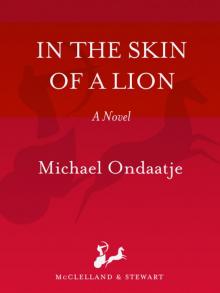 In the Skin of a Lion
In the Skin of a Lion The Cinnamon Peeler
The Cinnamon Peeler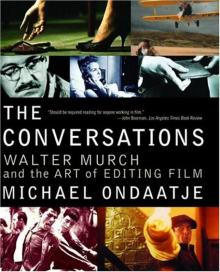 The Conversations: Walter Murch and the Art of Editing Film
The Conversations: Walter Murch and the Art of Editing Film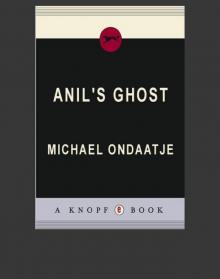 Anil's Ghost
Anil's Ghost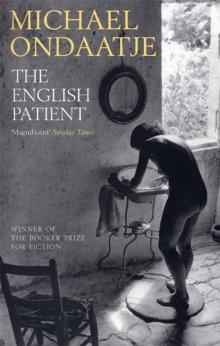 The English Patient
The English Patient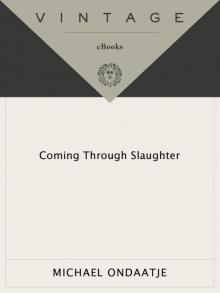 Coming Through Slaughter
Coming Through Slaughter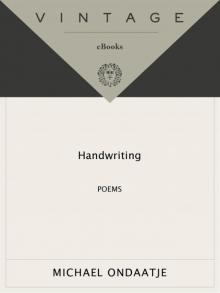 Handwriting
Handwriting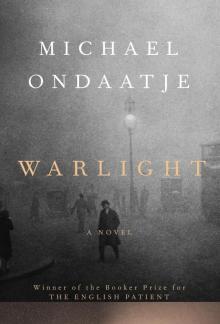 Warlight
Warlight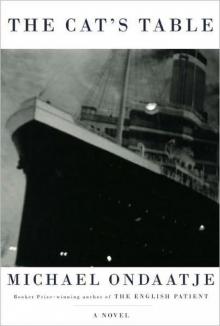 The Cat's Table
The Cat's Table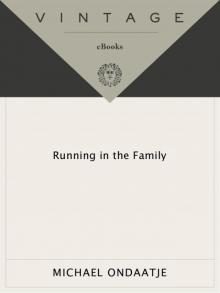 Running in the Family
Running in the Family The Collected Works of Billy the Kid
The Collected Works of Billy the Kid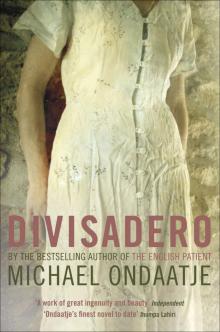 Divisadero
Divisadero